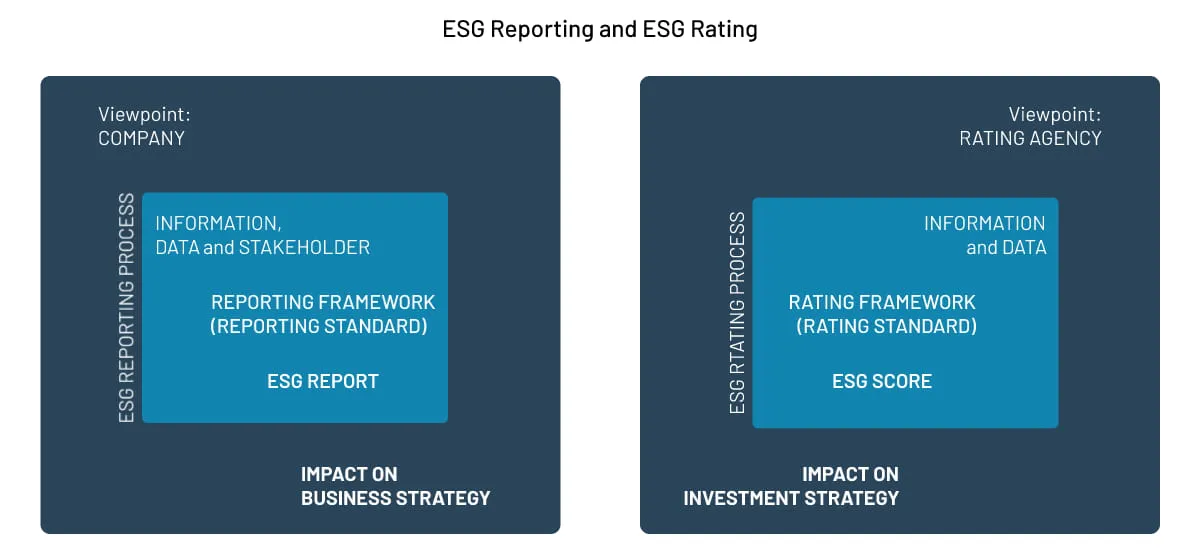An ESG definition
What is the meaning of ESG or Environment, Social or Governance? How is ESG related to the Sustainable Development Goals? Is ESG a topic linked exclusively to investments, or does it play a role in overall business strategy, too? We discuss these questions in this article.
Overview | TOC
- An ESG definition – what is the meaning and impact of ESG?
- ESG factors
- How has ESG evolved?
- What is the difference between ESG ratings, ESG reporting and sustainability reporting?
- How is ESG linked to the Sustainable Development Goals?
- What are common ESG standards and frameworks?
- Is ESG just a trend?

An ESG definition - what is the meaning and impact of ESG?
There are several definitions for ESG or Environmental, Social and Governance (sometimes also called Environmental, Social and Corporate Governance). ESG is about the ability of a company for long-term value creation in a fast-changing business environment and about the management of these risks and opportunities arising from this fast-paced change, too. An investor preparing an investment decision may have different priorities on ESG compared to a company trying to improve its ability for long-term value creation, while both are using ESG as a tool to accomplish their goals.
ESG means to evaluate how a company performs in environmental, social and governance criteria to determine the level of sustainability that it has achieved. The compiled data from these metrics provide insights on overall sustainability and leads to an ESG score or report.
What are ESG factors?
Environment
Environmental criteria focus on the input and output of a company, for instance, energy and water consumption. Waste management and by-products are taken into consideration, too. Directly linked to energy usage are greenhouse gas emissions. Every business affects and is affected by the environment. Risk exposure to climate change is one example that is relevant to almost every company.
Social
Social criteria are not only tied to labour standards, diversity and inclusion. The focus is on all relationships and interconnections a company has with its stakeholders: communities, institutions and the general public – and social criteria have a significant exposure when it comes to reputation. Social aspects are not limited to internal stakeholders but can extend to the entire supply chain, including other EHS related topics.
Governance
Finally, there is governance. It is all about the practises checks and balances, and procedures that a company implemented to govern itself. It is about how the interests of internal and external stakeholders are balanced and about the frameworks that guide decision making, how to meet the needs of all stakeholders and comply with the law.
How has ESG evolved?
ESG has evolved from other standards and frameworks, and this process is still going on, as can be seen in the development of ESG standards.
Franklin D. Roosevelt spoke of natural capital and finding a balance of resources as early as 1937. Social aspects stem from many achievements of the recent past. The strengthening of workers rights is one example of that. In the 1980s, EHS or Environment, Health and Safety moved into the focus. Sustainability gained importance in the 1990s, whereby the focus was in the context of the environment and nature. In the early 2000s, Corporate Social Responsibility (CSR) became a topic. From 2020 onwards, ESG rose significantly in perception. Initially, in the context of investments, it evolved into a strategic tool for business planning.
ESG and CSR, when used synonymously, may lead to the impression that they are identical, but that is not the case. ESG has a broader focus that covers more aspects and areas than CSR does.
What is the difference between ESG ratings, ESG reporting and sustainability reporting?
ESG Ratings
With asset managers and financial institutions increasingly relying on ESG, specialized rating agencies have developed ESG rating or scoring products. By assessing companies’ ESG performance, they provide an ESG rating/score based on their findings. This score is relevant for investment strategies. Each rating agency may use different frameworks and metrics to rate a companies ESG performance.
ESG Reporting
Companies, businesses, and institutions are aware that ESG factors are relevant to their business strategy and their ability for long-term value creation. Information, data, materiality aspects and also stakeholder opinion are the foundation for an ESG report. The ESG framework/standard decided upon defines the metrics for this process. The findings are relevant to the overall business strategy, and the company discloses them in an ESG report.

What is the link between ESG and Sustainable Development Goals?
The Sustainable Development Goals (SDGs) and the Ten Principles are the foundation of the UN Global Compact Strategy 2021 – 2023. The priority issues addressed are human rights, labour, environment and anti-corruption. Almost 13.000 companies from 160 countries participate in the process. The SDGs are an opportunity for companies to align to sustainability principles.
What are common ESG standards and frameworks?
What is an ESG standard, and how is it related to ESG reporting? In a nutshell, an ESG standard provides a framework and all the metrics needed for reporting. The framework will guide the process of how data is collected and processed. That helps to identify gaps in the reporting – e.g. if no or insufficient information is available. The result is an ESG report published by the company. With ESG reporting performed regularly, it showcases the efforts made, the progress, and the goals achieved.
Read this article about ESG standards and ESG reporting to learn more.
ESG definition - Is ESG just a trend?
ESG definition – is it just a trend? ESG is here to stay. It is more than just a trend that will pass by. According to research and studies, ESG can have a positive impact on business.
Investments in ESG projects have substantially grown, as has stakeholder awareness related to ESG factors.
Companies that take ESG considerations into account can perform better by creating sustainable growth and long-term value while avoiding risks.
Green products have a better acceptance. Policies on energy usage, waste avoidance and reduced water intake can lead to cost reductions. The strategic approach to sustainability from ESG can lead to better interaction with regulating bodies, too. ESG is also about money. Incorporating an ESG approach can lead to better capital allocation and credit ratings.
Investments, project financing and company valuation
Finally, there are investments, project financing and company valuation, where ESG ratings have an impact. ESG-oriented investments are on the rise. Worldwide sustainable investments are already topping US$30 trillion, increased by almost 70% compared to 2014 or more than ten times more than in 2004. Executives have realized that a strong ESG proposition is a cornerstone for both long-term success and value-creation.




